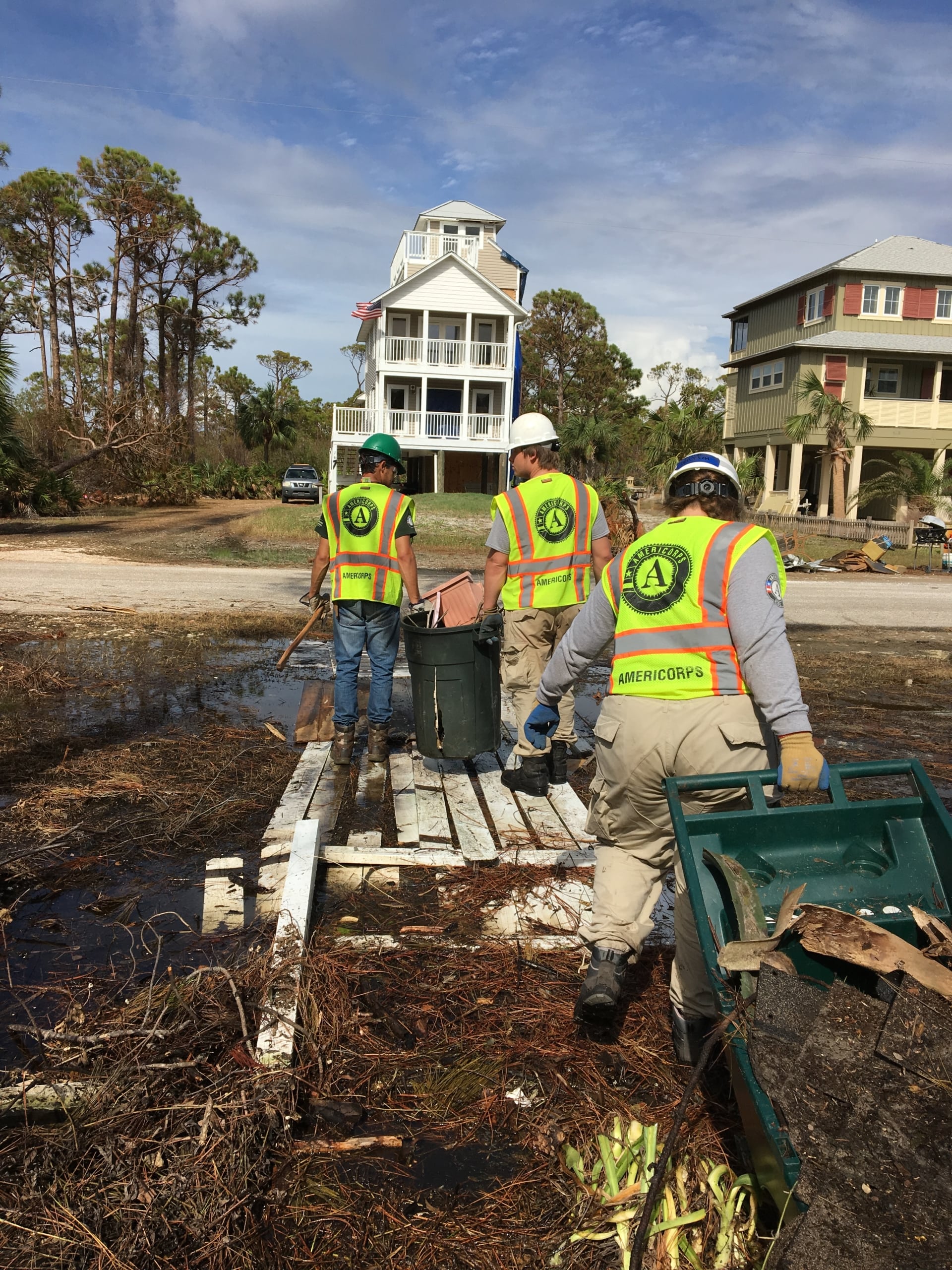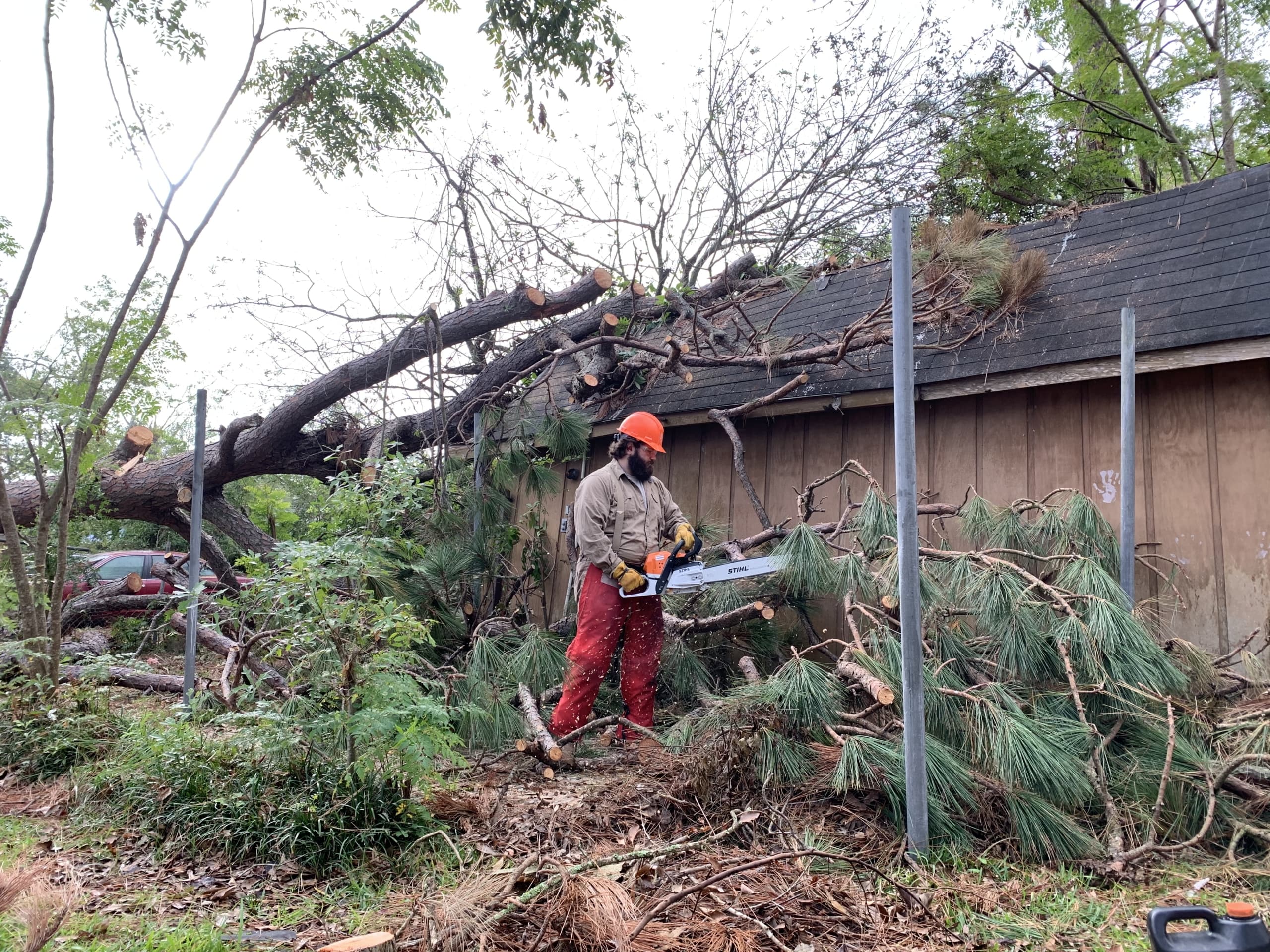September is National Preparedness Month and we are highlighting Corps that are involved in disaster response work. Based in Austin, TX, American YouthWorks (AYW), operates several programs including YouthBuild Austin, Louisiana Conservation Corps, and Texas Conservation Corps (TxCC).
Responding to Need
TxCC is part of the AmeriCorps Disaster Response Team (A-DRT) program. Their AmeriCorps crews, along with AmeriCorps members from other Conservation Corps, deploy to help with emergency response and recovery efforts across the country. This can include managing volunteers and donated supplies, staffing shelters, conducting damage assessments, gutting flooded homes, and more.
TxCC became involved with disaster response after working alongside a relief group in the aftermath of Hurricane Katrina in 2005. Since then, TxCC has responded to disasters like the 2011 Joplin Tornado, the West Fertilizer Plant explosion, Hurricane Harvey, the Bastrop County Complex fire, the Typhoon in Saipan, Mariana Islands (a US Province), Hurricanes Maria and Irma in US Virgin Islands, flooding in Alaska, and Oklahoma Tornadoes. Upon receiving a disaster response grant through the Texas State Service Commission, the OneStar Foundation, TxCC established a dedicated disaster response program.
As explained by American YouthWorks, AmeriCorps programs and uniquely Conservation Corps are especially well-equipped to participate in disaster work.
“It’s this nice marriage of a crew that has leadership established, an identified crew leader, individuals that are used to hard and intense labor, being outside and in the heat, harsh conditions, even sleeping in a tent,” says David Bock, TxCC Disaster Response Programs Coordinator. “It’s a good fit. It’s not like we’re first responders, but we’re usually there right after that emergency and the conditions are still rough.”
Conservation Corps give states a reliable resource for volunteer management, organizing unaffiliated individuals that show up ready to help after a natural disaster. Typically, once a disaster occurs, AmeriCorps crews are on standby and ready to deploy for 30 to 60 days at a time. A federal declaration must be made through the Federal Emergency Management Agency (FEMA) and the state to use AmeriCorps as a resource. Crews are currently on standby to deploy for Hurricane Ida response.
In response to Hurricane Michael, which hit the Florida Pan Handle in 2018, AmeriCorps crews sorted 34,740 lbs. of donations, collected and distributed 19,800 lbs. of food, and removed 275 hazard trees. These stats show the magnitude of the disaster response crews’ impact.

Serving During COVID-19
The pandemic has altered the work of the TxCC disaster response program and other A-DRT crews. It has not been as safe to deploy with intimate living and working quarters. This past spring, AmeriCorps crews assisted with COVID-19 response efforts in Roanoke, VA, primarily doing outreach and also supporting vaccination sites. TxCC collaborated with the Virginia Department of Health (VDH) and the Virginia Department of Emergency Management (VDEM). This included going door to door providing vaccine information and staffing a vaccine clinic for local residents. Crews visited 978 homes, distributed 391 COVID-19 Care Packages, and helped get 9,570 people vaccinated.
“I was very excited because the whole last year and a half, I think a lot of us felt powerless to this whole thing. I didn’t have any say in it, all I can do is wear my mask and social distance, and do what the CDC is telling me. So to know that I get to go out and directly impact this pandemic with my efforts made me feel really empowered,” says Daniel Gerardi, a TxCC AmeriCorps member who deployed to Roanoke. “I’m so glad I made the choice to join the Conservation Disaster Crew because it is actually concrete help.”

The AmeriCorps Member Experience
Besides immediate disaster response and relief efforts, AmeriCorps members at TxCC complete requests for wildfire fuel mitigation and creating defensible spaces around communities. Corpsmembers regularly train for this type of physical work. Corpsmembers at TxCC can receive various certifications, including the S-212 wildland fire chainsaw certification and a “Red Card,” or wildfire Incident Qualification Card. Corpsmembers also do trainings in watershed restoration, rigging, and other technical skills.
Being a Corpsmember on this type of team also poses many challenges.
“Corpsmember’s have mental, physical, emotional fatigue from performing in the chaos and interacting with people and survivors who have gone through a very traumatic experience. Our members are a breath of fresh air and hope,” says Parc Smith, American YouthWorks CEO. “Some things that help are emotional support animals or therapy dogs and other fun activities at the end of the service days.”
With the rise of disasters, from flooding to wildfires, the need for disaster response crews continues to increase. After a deployment to Louisiana, the local community saw the need for their own Conservation Corps. TxCC assisted in creating the Louisiana Conservation Corps. A modern Civilian Conservation Corps initiative could create the opportunity to expand and enhance this type of work in every state. Smith explains that community engagement should also be a part of implementation of a CCC: “If the CCC is going to do community education around preparedness, then there is a need for community engagement training – exactly how to talk to residents and build trust.”
Whether or not a CCC is ever fully implemented, current disaster response Corpsmembers find the work important and rewarding. Lyn Cummings, a TxCC AmeriCorps member reflects, ”Disaster deployment helped me to know that leadership in the Corps was right for me. Everyone has the opportunity to step up and fill leadership roles within the deployment community. There are so many moving parts and things to do.”
When asked what he has gained from his time in disaster response work, Cummings said, “ The hard skills we learned – the outdoor technical skills, chainsaw skills – are tremendous, but I think the most useful skills I continue to build and will have with me for the rest of my life are the soft skills. They were tested and solidified during deployment: interacting with people, conflict management, crew dynamic, leadership, all of the social aspects of being an AmeriCorps member. I think other than service, the one thing that ties all Corpsmembers together are those social skills that we build while in these programs.”
Corspmember Geraldi also finds a similar takeaway: “The service mindset. I’ve always sort of been community minded, but realizing that applying my efforts to help reduce people’s suffering, and help people live better lives feels like the only meaningful thing we can do.”





































































